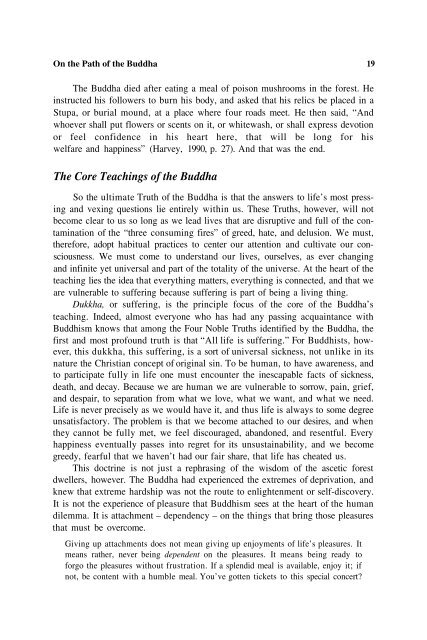Psychology & Buddhism.pdf
Psychology & Buddhism.pdf
Psychology & Buddhism.pdf
You also want an ePaper? Increase the reach of your titles
YUMPU automatically turns print PDFs into web optimized ePapers that Google loves.
On the Path of the Buddha 19<br />
The Buddha died after eating a meal of poison mushrooms in the forest. He<br />
instructed his followers to burn his body, and asked that his relics be placed in a<br />
Stupa, or burial mound, at a place where four roads meet. He then said, “And<br />
whoever shall put flowers or scents on it, or whitewash, or shall express devotion<br />
or feel confidence in his heart here, that will be long for his<br />
welfare and happiness” (Harvey, 1990, p. 27). And that was the end.<br />
The Core Teachings of the Buddha<br />
So the ultimate Truth of the Buddha is that the answers to life’s most pressing<br />
and vexing questions lie entirely within us. These Truths, however, will not<br />
become clear to us so long as we lead lives that are disruptive and full of the contamination<br />
of the “three consuming fires” of greed, hate, and delusion. We must,<br />
therefore, adopt habitual practices to center our attention and cultivate our consciousness.<br />
We must come to understand our lives, ourselves, as ever changing<br />
and infinite yet universal and part of the totality of the universe. At the heart of the<br />
teaching lies the idea that everything matters, everything is connected, and that we<br />
are vulnerable to suffering because suffering is part of being a living thing.<br />
Dukkha, or suffering, is the principle focus of the core of the Buddha’s<br />
teaching. Indeed, almost everyone who has had any passing acquaintance with<br />
<strong>Buddhism</strong> knows that among the Four Noble Truths identified by the Buddha, the<br />
first and most profound truth is that “All life is suffering.” For Buddhists, however,<br />
this dukkha, this suffering, is a sort of universal sickness, not unlike in its<br />
nature the Christian concept of original sin. To be human, to have awareness, and<br />
to participate fully in life one must encounter the inescapable facts of sickness,<br />
death, and decay. Because we are human we are vulnerable to sorrow, pain, grief,<br />
and despair, to separation from what we love, what we want, and what we need.<br />
Life is never precisely as we would have it, and thus life is always to some degree<br />
unsatisfactory. The problem is that we become attached to our desires, and when<br />
they cannot be fully met, we feel discouraged, abandoned, and resentful. Every<br />
happiness eventually passes into regret for its unsustainability, and we become<br />
greedy, fearful that we haven’t had our fair share, that life has cheated us.<br />
This doctrine is not just a rephrasing of the wisdom of the ascetic forest<br />
dwellers, however. The Buddha had experienced the extremes of deprivation, and<br />
knew that extreme hardship was not the route to enlightenment or self-discovery.<br />
It is not the experience of pleasure that <strong>Buddhism</strong> sees at the heart of the human<br />
dilemma. It is attachment – dependency – on the things that bring those pleasures<br />
that must be overcome.<br />
Giving up attachments does not mean giving up enjoyments of life’s pleasures. It<br />
means rather, never being dependent on the pleasures. It means being ready to<br />
forgo the pleasures without frustration. If a splendid meal is available, enjoy it; if<br />
not, be content with a humble meal. You’ve gotten tickets to this special concert?











